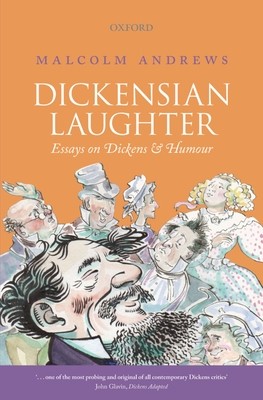
- We will send in 10–14 business days.
- Author: Malcolm Andrews
- Publisher: Oxford University Press, USA
- ISBN-10: 0198728042
- ISBN-13: 9780198728047
- Format: 12.7 x 19.3 x 1.5 cm, minkšti viršeliai
- Language: English
- SAVE -10% with code: EXTRA
Reviews
Description
How does Dickens make his readers laugh? What is the distinctive character of Dickensian humor? These are the questions explored in this book on a topic that has been strangely neglected in critical studies over the last half century. Dickens's friend and biographer John Forster declared that "[Dickens's] leading quality was Humor."' At the end of Dickens's career he was acclaimed as "the greatest English Humorist since Shakespeare's time." In 1971 the critic Philip Collins surveyed recent decades of Dickens criticism and asked "from how many discussions of Dickens in the learned journals would one ever guess that (as Dickens himself thought) humor was his leading quality, his highest faculty?" Forty years later, that rhetorical question has lost none of its force. Why? Perhaps Dickens's genius as a humorist is simply taken for granted, and critics prefer to turn to his other achievements; or perhaps humor is too hard to analyze without spoiling the fun? Whatever the reason,
there has been very little by way of sustained critical investigation into what for most people has constituted Dickens's special claim to greatness.
considers not only Dickens's novels but also his letters and journalism. And to that end there are copious quotations. The aim of the book is to make readers laugh and also to prompt them to reflect their laughter. It should have an interest not only for Dickensians but for anyone curious about the nature of laughter and how it is triggered.
EXTRA 10 % discount with code: EXTRA
The promotion ends in 22d.13:45:24
The discount code is valid when purchasing from 10 €. Discounts do not stack.
- Author: Malcolm Andrews
- Publisher: Oxford University Press, USA
- ISBN-10: 0198728042
- ISBN-13: 9780198728047
- Format: 12.7 x 19.3 x 1.5 cm, minkšti viršeliai
- Language: English English
How does Dickens make his readers laugh? What is the distinctive character of Dickensian humor? These are the questions explored in this book on a topic that has been strangely neglected in critical studies over the last half century. Dickens's friend and biographer John Forster declared that "[Dickens's] leading quality was Humor."' At the end of Dickens's career he was acclaimed as "the greatest English Humorist since Shakespeare's time." In 1971 the critic Philip Collins surveyed recent decades of Dickens criticism and asked "from how many discussions of Dickens in the learned journals would one ever guess that (as Dickens himself thought) humor was his leading quality, his highest faculty?" Forty years later, that rhetorical question has lost none of its force. Why? Perhaps Dickens's genius as a humorist is simply taken for granted, and critics prefer to turn to his other achievements; or perhaps humor is too hard to analyze without spoiling the fun? Whatever the reason,
there has been very little by way of sustained critical investigation into what for most people has constituted Dickens's special claim to greatness.
considers not only Dickens's novels but also his letters and journalism. And to that end there are copious quotations. The aim of the book is to make readers laugh and also to prompt them to reflect their laughter. It should have an interest not only for Dickensians but for anyone curious about the nature of laughter and how it is triggered.


Reviews